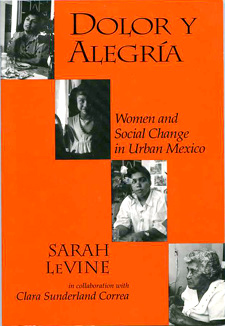|
Dolor
y Alegría
Women
and Social Change in Urban Mexico
Sarah LeVine
In Collaboration with Clara Sunderland Correa
In Dolor y Alegría (Sorrow and Joy), fifteen mothers,
grandmothers, and great grandmothers in the Mexican city of Cuernavaca
speak about the dramatic effects that urbanization and rapid
social change have had on their lives. Sarah LeVine deftly combines
these autobiographical vignettes with ethnographic material,
survey findings, and her own observations. The result is a vivid
picture of contrast and continuity.
While many earlier publications have focused on the poor of Latin
America who live at the margins of urban life, Dolor y Alegría
explores the experiences of ordinary working and lower-middle
class women, most of them transplants from villages and small
towns to a densely populated city neighborhood. In their early
years, many experienced family disruption, emotional deprivation,
and economic hardship; but steadily increasing educational opportunities,
improved health care, and easily available contraception have
significantly altered how the younger women relate to their families
and the larger society.
Today's Mexican schoolgirl, LeVine shows, is encouraged to apply
herself to her studies for her own benefit, and the longer she
remains in school, the greater the self-confidence she will carry
with her into the world of work and later into marriage and motherhood.
Hard economic times have forced many married women into the workplace
where their sense of personal efficacy is enhanced; at the same
time, in the domestic sphere, their earnings allow them greater
negotiating power with husbands and male relatives. Changes are
not confined to the younger generation. Older women are enjoying
better health and living longer; but with adult children either
less able or willing to accept responsibility for aged parents
than they were in the past, anxiety runs high and family relations
are often strained.
Dolor y Alegría takes a close look at the efforts
of three generations of Mexican women to redefine themselves
in both family and workplace; it shows that today's young woman
has very different expectations of herself and others from those
that her grandmother or even her mother had.
Sarah LeVine is research associate at the Harvard Graduate
School of Education. Her books include Mothers and Wives:
Gusii Women of East Africa. Clara Sunderland Correa
is a child therapist in private practice in Mexico.
Media & bookseller inquiries regarding review copies, events, and interviews can be directed to the publicity department at publicity@uwpress.wisc.edu or (608) 263-0734. (If you want to examine a book for possible course use, please see our Course Books page. If you want to examine a book for possible rights licensing, please see Rights & Permissions.) |
|

May
1993
LC: 92-039037 HQ
245 pp. 6 x 9, 22 halftones
ISBN 0-299-13794-5 Paper $19.95 x



Add titles to your shopping cart by clicking on the "Add this book to cart" link above. You
can submit your order electronically, paying for it with your credit card.
Click
here for a further explanation of the shopping cart feature
Never
ordered from us before?
Read this first. |
